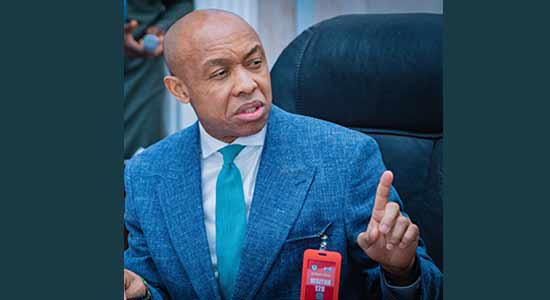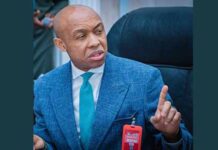On matters of security, the bulk (sic) stops at the President’s table—Bola Ahmed Tinubu, April 2014
On 26 January 2009, the Mamman Bello Ali died. He was the governor of Yobe State in north-east Nigeria.
At around the same time, an anti-terrorism campaign by the government of Nigeria in Yobe State and its neighbour, Borno State, was about to make a murderous transition into a full-blown insurgency. As Governor Mamman Ali made his earthly transition in a Florida hospital, his deputy, Ibrahim Gaidam assumed office on the same day as the new governor of Yobe State.
Today, as Minister of Police Affairs in the federal government, Governor Gaidam, whose life in politics has included a stint as a member of the Senate, has high responsibility for policing the country. He is so ineffectual in this role that few Nigerians notice his existence.
Around 9 November 2014, a suicide-bomber dressed as a student detonated himself in the middle of school assembly at the Government Boys Secondary School in Potiskum, Yobe State.
The police confirmed that the attack “left 47 people dead, including the suicide bomber. Another 79 were wounded. Dozens of students were injured so severely medics were unable to save them.”
It was a tragedy on an unspeakable scale. The blame for the attack fell on Jama’atu Ahlis-Sunna Lidda’Awati Wal-Jihad, (the Islamist insurgency better known as Boko Haram). Ibrahim Gaidam was still Governor.
The following day, President Goodluck Jonathan’s campaign was in full swing as he sought the support of the country for his re-election in 2015 under the banner of the then ruling Peoples’ Democratic Party. The All Progressives Congress, then newly formed as an opposition Alliance was quick to take political advantage. It described Jonathan’s campaign launch as “insensitive and callous” and accused him and the PDP of “dancing on the graves of the pupils as well as of all the victims of Boko Haram insurgency.” The APC took the opportunity to recall another mass-casualty bombing incident in Nyanya on the outskirts of Abuja in April 2014 and said that following that incident, “President Jonathan went dancing ‘Azonto’ in Kano less than 48 hours later.”
In the period from 2009 to 2014, when Islamist violence of Boko Haram in north-east Nigeria transitioned into a full-blown insurgency, the Peoples’ Democratic Party (PDP) was in power. Educational infrastructure bore a major brunt of the attacks by the group which built a brand in murderous violence by campaigning against Western education. The worst-affected states – Borno and Yobe – happened to be outside the orbit of the ruling party. In the half-decade to 2014, the violence accounted for at least 611 teachers reportedly killed and another 19,000 forced to flee. In 2014 alone, the insurgency killed over 6,644 persons in the affected states.
In May 2014, the United Nations Security Council listed Boko Haram as a terrorist organisation. Three years earlier, the Gaji Galtimari Presidential Committee on the Security Challenges in the North-East Zone of Nigeria had reported that the group “started as an innocuous non-violent group” around 2003.
This rise in Boko Haram’s campaign of mass-casualty violence was both new and shocking. The response of the then ruling government appeared slow, ponderous, and mal-adapted. It was also political season. The escalation in the attacks and killings from the Islamist insurgency in north-east Nigeria in 2014 coincided with the run-up to Nigeria’s 2015 general elections.
For the PDP in power at the time, it was a struggle to manage the optics of campaigning in the midst of growing carnage. The APC, then a new opposition formation, relished in its role, making political capital out of the situation. Its forceful critique of the PDP’s management of the Boko Haram insecurity or lack of it was central in ensuring the defeat of the ruling party in the 2015 election.
The popular narrative of Muhammadu Buhari, the APC candidate for the presidency in 2015, as a no-nonsense soldier did more than any other thing in reassuring Nigerians that the party would bring competence to the handling of the crisis of insecurity in the country. Instead, since then, insecurity in Nigeria has metastasized under the successive presidencies of President Muhammadu Buhari and his successor, Bola Ahmed Tinubu. The violence, which was mostly confined in the states of the north-east one decade ago, has become hydra-headed under various nomenclatures all over the country.
In its latest Conflict Barometer (2024) report, the Heidelberg Institute for International Conflict Research identified at least 10 sites of active, conflict-related killings in Nigeria, at least five of which fall into the highest classifications of seriousness.
In the north-east, Boko Haram has mutated into a confederacy of mass-murder under different appellations, each seeking supremacy in an Olympiad of mass-casualty violence.
In North-Central Nigeria, the party chose to mis-characterise as “farmer-herder” clashes, a methodical campaign of land-grabbing by people described by the government mostly as “foreigners.”
Under the watch of the APC government, in 2021, the north-west overtook the northeast in mass-casualty atrocities. Unable to manage the situation in the region, the government took to labeling the perpetrators of the atrocities in the north-west as “bandits.”
Unlike the north-east where improvised explosive devices (IEDs) and suicide-bombers were major features of the insurgency, the major items in the violence in the north-west are motor-bikes and Kalashnikovs. Yet, the government cannot account for how these bikes and guns get into the hands of those who use them to habitually liquidate Nigerians on an industrial scale.
Kaduna was central in this shift. Installed in power in 2015 in the APC Tsunami as the new APC Governor of strategically significant Kaduna State, Nasir El-Rufai, was voluble in promoting mass-murder as profitable, incredibly proclaiming on national television how he paid the killers of Nigerians in order to encourage them to stop killing. The casual malevolence of his proferred justification was beyond shocking: “We got a group of people that were going round trying to trace some of these people in Cameroon, Niger and so on to tell them that there is a new governor who is Fulani like them and has no problem paying compensations for lives lost and he is begging them to stop the killing.”
Even worse, the mis-management of the insecurity under the government of the APC has smacked of a level of indifference, cynicism, and lack of empathy that the PDP would never have dreamed of. In Benue State last week, all of this was on show. Forced by public opinion finally to re-route himself to visit victims of mass liquidation in Benue State, in Nigeria’s Middle Belt, President Bola Ahmed Tinubu first had children line up in the rain to be splashed with mud by his majestic convoy before the obligatory serenading from uniformed women living in internal displacement from the violence. It was right out of the manual of political narcissism jointly authored by Louis VIX and Marie Antoniette.
While the country burns, the president has curiously eloped to Saint Lucia, a territory of about 179,000 persons described by the Global Organised Crime Index as “a key Caribbean transit hub for cocaine shipments bound mainly for the US, Europe or Canada.” To the Nigerians concerned about the optics of all this, it is as if all he can offer is the middle finger.
The only thing more abysmal than the indifference of the ruling APC government to the current crisis of mass-murder across the country has been the disgraceful abdication by the political opposition. In the midst of all this carnage, little has been heard from them. Instead, opposition politicians have been hyper-active in the political transfer season herding into the APC.
Those who expect the police, armed and security services to shoot the country out of this crisis are unlikely to get their wish. The durability of Nigeria’s insecurity crisis is essentially a crisis of irresponsible political leadership. The security services can only implement a strategy set by the politicians. At the moment, the politicians are fixated on 2027. By then, in many parts of Nigeria, there may be no voters left and many of those in place would have been displaced from their voters cards. But the politicians do not have to care because they do not need voters to get into office. That is the original sin of insecurity in Nigeria.
A lawyer and teacher, Odinkalu can be reached at chidi.odinkalu@tufts.edu










